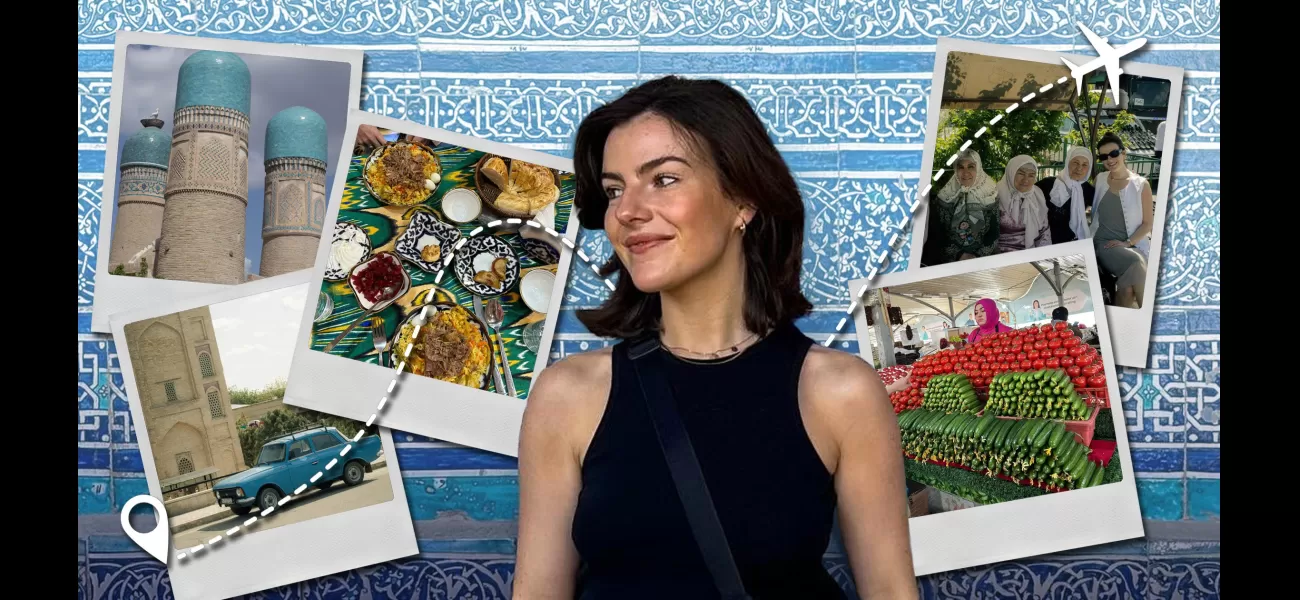Exhausted, I traveled to Uzbekistan and discovered what I had been lacking.
You can too.
April 28th 2024.

Alice Murphy, an adventurous travel agent, embarked on a journey to Uzbekistan that lasted for seven days. Her friends were perplexed when she announced her destination, a former Soviet republic nestled between Russia, China, and several other "Stans". They asked her, "Why on earth are you going there?" But Alice had many reasons, all rooted in the country's rich history as a key stop on the Silk Road and its enchanting charm as the cradle of Central Asian culture for over 2000 years. However, the main reason was simple - she needed a break from the hustle and bustle of London, where she had been living for two years after moving from Sydney, and she longed to reignite her passion for exploring the world.
And Uzbekistan did not disappoint. With its breathtaking architecture, cities adorned with turquoise tiles, and spiritual sunsets, Alice was captivated from the moment she arrived. Her first stop was Tashkent, the capital city, which was brimming with Soviet-era buildings and remnants of the country's past. Guided by Tatiana, one of four knowledgeable guides she met on her Silk Road trail, Alice visited iconic landmarks like Khast Imam Square, which houses the world's oldest Quran, and the bustling Chorsu Bazaar, where she witnessed traditional bread-making in ovens. Despite being a little hard to locate on a map, Tashkent had a unique charm that intrigued Alice.
One of the highlights of her trip was the Hotel Uzbekistan, an imposing building that once welcomed high-ranking officials of the Communist regime. Alice also stopped for a drink at Pelikan Craft, a Soviet-style beer shop that served a variety of beers on tap. As she sipped on her pint, she couldn't help but notice the feeling of safety and warmth that enveloped her in this city of 2.4 million people. Uzbekistan was not a popular destination for British tourists, with only around 10,000 visiting each year. But, as Alice discovered, it had never been easier to get there. The complex visa rules and corruption that plagued the country a decade ago had disappeared after the death of President Islam Karimov in 2016. Now, over 60 nationalities, including the UK, most EU countries, New Zealand, Australia, and South Korea, could enjoy 30 days of visa-free travel to Uzbekistan.
Alice was not alone in her fascination with Uzbekistan. It was now the most visited of all the Central Asian republics, and it was not hard to see why. She was intrigued by the Silk Road, an ancient trade route that spanned 12,000km and connected China to the West. It was considered the center of civilization for over a thousand years and got its name from the Chinese silk that was highly sought after by merchants along the way.
Her next stop was Samarkand, the most famous city on the Silk Road, and she was eager to explore its spellbinding architecture. She took the high-speed train, Afrosiyab, which offered free tea and coffee and more legroom than she had expected. Upon arrival, Alice was greeted by her guide, Rukhana, who wasted no time in taking her to the mausoleum of Amir Timur, a fierce commander and national hero who had conquered large parts of Central Asia in the 14th century. The intricate tiled mosaics and dazzling gold ceilings of the grand memorial were a testament to his formidable legacy.
But the real gem of Samarkand was Registan, a magnificent square where mosques, madrasas, and minarets converged. As Alice marveled at the beauty of the place, she was approached by a friend of Rukhana's, who happened to be the director of the oldest building in the square. He offered her a chance to climb one of the minarets for a bird's eye view of the area, and she eagerly accepted. The climb was dizzying, but the view was breathtaking. She could see the intricate mosaics and symbols of Zoroastrianism, the ancient Persian religion that was once widely practiced in Uzbekistan. As night fell, locals gathered in the square with their children, munching on popcorn and enjoying the ethereal ambience. Alice couldn't help but notice the joy on everyone's faces and imagined what a wonderful place it must be to grow up in.
She couldn't resist sharing with Rukhana a recent study that ranked Uzbekistan as the most miserable country in the world, and asked her opinion on it. Rukhana's response surprised her. She explained that while many young people in Uzbekistan dreamt of leaving, they often didn't realize how good life was there and how challenging it could be abroad. Alice couldn't help but feel grateful for the opportunity to experience this beautiful country and its warm and welcoming people.
As her trip came to an end, Alice reflected on the wonders she had encountered in Uzbekistan. From its rich history and charming cities to its exquisite mosques and friendly locals, it was a place that left a lasting impression on her. And she was grateful for the chance to escape the rat race and rekindle her love for the world we live in.
Alice Murphy, an agent at the Agency, recently took a trip to Uzbekistan that lasted seven days. She was amazed by the incredible sights and experiences that this country had to offer to every type of traveler. When she first mentioned her plans to friends, they questioned her decision, wondering why she would choose to visit a former Soviet republic located between Russia, China, and other neighboring "Stans". Alice had many reasons for wanting to go, including the country's rich history along the Silk Road and the ancient allure of a place that had been the center of Central Asia's culture for over 2000 years. But the main reason was simple - she was exhausted and in need of a break from the fast-paced life in London, where she had been living for the past two years after moving from Sydney. She was eager to reignite her fascination with the world and its wonders. And Uzbekistan, with its breathtaking architecture, charming turquoise-tiled cities, and enchanting sunsets, did not disappoint.
The first stop on Alice's seven-day journey was Tashkent, the capital city of Uzbekistan. After a seven-hour flight, she was greeted by a bustling city filled with remarkable Soviet-era buildings and remnants of the USSR. Her first guide, Tatiana, took her to some of the standout sights, such as Khast Imam Square, which is home to what is believed to be the oldest Quran in the world. They also visited the lively Chorsu Bazaar, where Alice was able to witness traditional bread-making in the local ovens. Although Tashkent may not be easy to spot on a map, it is a city with a rich history and a warm and welcoming atmosphere. While admiring the impressive facade of Hotel Uzbekistan, a former Communist regime headquarters, Alice and her guide stopped for a drink at Pelikan Craft, a Soviet-style beer shop that served both IPA and local lager on tap. As they sipped their drinks on one of Tashkent's wide boulevards, Alice couldn't help but feel safe and at ease in this city of 2.4 million people. The people of Uzbekistan were incredibly friendly and welcoming, and it wasn't long before Alice and her guide were joined by three young locals eager to practice their English. Despite being a popular destination for tourists, British travelers are not very common in Uzbekistan, with only about 10,000 visitors per year. However, it has become increasingly easier to travel there in recent years. Just a decade ago, Uzbekistan was known for its complicated visa requirements and corruption. But since the passing of President Islam Karimov in 2016, obtaining a visa has become much simpler. Over 60 nationalities, including the UK, most EU countries, New Zealand, Australia, and South Korea, can now visit for up to 30 days without a visa. As a result, Uzbekistan has become the most visited country in Central Asia, and it's not difficult to see why.
One of the main attractions of Uzbekistan is its location along the Silk Road, an ancient trading route that connected China with the West and was considered the center of civilization for over a thousand years. This 12,000km route is named after the Chinese silk that was sold by merchants along the way. It is also known as the first global trading route in history.
Alice's next stop was Samarkand, the largest and most famous city along the Silk Road. She and her guide took the high-speed Spanish-owned Afrosiyab train, which was surprisingly comfortable and even offered free tea and coffee. Their first stop was the mausoleum of Amir Timur, a fierce commander and national hero who conquered much of Central Asia in the 14th century. The intricate tiled mosaics and dazzling gold ceilings of the massive memorial were a clear indication of Timur's power and influence. However, the main attraction in this city was Registan, a spectacular square where mosques, madrassas, and minarets come together in a stunning display. As they explored the square, Alice's guide introduced her to a friend who happened to be the director of the oldest building in the square. He kindly offered them the opportunity to climb one of the minarets for a bird's eye view of the area. The climb was dizzying, but the view was well worth it. From above, they could see the intricate mosaics and symbols of Zoroastrianism, the ancient Persian religion that used to be the most widely practiced in Uzbekistan. While Registan was already beautiful during the day, it came alive at night, when locals would bring their children to enjoy popcorn and music in the enchanting glow of the square's lights. The atmosphere was joyful and it seemed like a wonderful place to grow up. Alice couldn't help but mention a recent study that ranked Uzbekistan as the most miserable country in the world, and she asked her guide for her thoughts on this. Rukhana replied that while many young people in Uzbekistan dream of leaving, they often don't realize the beauty and opportunities that their own country offers, and they may not understand the challenges that come with living abroad.
Uzbekistan is also home to many cities that have been around for thousands of years. Its mosques are a true wonder to behold, with their glittering gold ceilings and stunning turquoise minarets. Alice was in awe of the country's rich history and incredible architecture, and she couldn't wait to see what else Uzbekistan had in store for her.
And Uzbekistan did not disappoint. With its breathtaking architecture, cities adorned with turquoise tiles, and spiritual sunsets, Alice was captivated from the moment she arrived. Her first stop was Tashkent, the capital city, which was brimming with Soviet-era buildings and remnants of the country's past. Guided by Tatiana, one of four knowledgeable guides she met on her Silk Road trail, Alice visited iconic landmarks like Khast Imam Square, which houses the world's oldest Quran, and the bustling Chorsu Bazaar, where she witnessed traditional bread-making in ovens. Despite being a little hard to locate on a map, Tashkent had a unique charm that intrigued Alice.
One of the highlights of her trip was the Hotel Uzbekistan, an imposing building that once welcomed high-ranking officials of the Communist regime. Alice also stopped for a drink at Pelikan Craft, a Soviet-style beer shop that served a variety of beers on tap. As she sipped on her pint, she couldn't help but notice the feeling of safety and warmth that enveloped her in this city of 2.4 million people. Uzbekistan was not a popular destination for British tourists, with only around 10,000 visiting each year. But, as Alice discovered, it had never been easier to get there. The complex visa rules and corruption that plagued the country a decade ago had disappeared after the death of President Islam Karimov in 2016. Now, over 60 nationalities, including the UK, most EU countries, New Zealand, Australia, and South Korea, could enjoy 30 days of visa-free travel to Uzbekistan.
Alice was not alone in her fascination with Uzbekistan. It was now the most visited of all the Central Asian republics, and it was not hard to see why. She was intrigued by the Silk Road, an ancient trade route that spanned 12,000km and connected China to the West. It was considered the center of civilization for over a thousand years and got its name from the Chinese silk that was highly sought after by merchants along the way.
Her next stop was Samarkand, the most famous city on the Silk Road, and she was eager to explore its spellbinding architecture. She took the high-speed train, Afrosiyab, which offered free tea and coffee and more legroom than she had expected. Upon arrival, Alice was greeted by her guide, Rukhana, who wasted no time in taking her to the mausoleum of Amir Timur, a fierce commander and national hero who had conquered large parts of Central Asia in the 14th century. The intricate tiled mosaics and dazzling gold ceilings of the grand memorial were a testament to his formidable legacy.
But the real gem of Samarkand was Registan, a magnificent square where mosques, madrasas, and minarets converged. As Alice marveled at the beauty of the place, she was approached by a friend of Rukhana's, who happened to be the director of the oldest building in the square. He offered her a chance to climb one of the minarets for a bird's eye view of the area, and she eagerly accepted. The climb was dizzying, but the view was breathtaking. She could see the intricate mosaics and symbols of Zoroastrianism, the ancient Persian religion that was once widely practiced in Uzbekistan. As night fell, locals gathered in the square with their children, munching on popcorn and enjoying the ethereal ambience. Alice couldn't help but notice the joy on everyone's faces and imagined what a wonderful place it must be to grow up in.
She couldn't resist sharing with Rukhana a recent study that ranked Uzbekistan as the most miserable country in the world, and asked her opinion on it. Rukhana's response surprised her. She explained that while many young people in Uzbekistan dreamt of leaving, they often didn't realize how good life was there and how challenging it could be abroad. Alice couldn't help but feel grateful for the opportunity to experience this beautiful country and its warm and welcoming people.
As her trip came to an end, Alice reflected on the wonders she had encountered in Uzbekistan. From its rich history and charming cities to its exquisite mosques and friendly locals, it was a place that left a lasting impression on her. And she was grateful for the chance to escape the rat race and rekindle her love for the world we live in.
Alice Murphy, an agent at the Agency, recently took a trip to Uzbekistan that lasted seven days. She was amazed by the incredible sights and experiences that this country had to offer to every type of traveler. When she first mentioned her plans to friends, they questioned her decision, wondering why she would choose to visit a former Soviet republic located between Russia, China, and other neighboring "Stans". Alice had many reasons for wanting to go, including the country's rich history along the Silk Road and the ancient allure of a place that had been the center of Central Asia's culture for over 2000 years. But the main reason was simple - she was exhausted and in need of a break from the fast-paced life in London, where she had been living for the past two years after moving from Sydney. She was eager to reignite her fascination with the world and its wonders. And Uzbekistan, with its breathtaking architecture, charming turquoise-tiled cities, and enchanting sunsets, did not disappoint.
The first stop on Alice's seven-day journey was Tashkent, the capital city of Uzbekistan. After a seven-hour flight, she was greeted by a bustling city filled with remarkable Soviet-era buildings and remnants of the USSR. Her first guide, Tatiana, took her to some of the standout sights, such as Khast Imam Square, which is home to what is believed to be the oldest Quran in the world. They also visited the lively Chorsu Bazaar, where Alice was able to witness traditional bread-making in the local ovens. Although Tashkent may not be easy to spot on a map, it is a city with a rich history and a warm and welcoming atmosphere. While admiring the impressive facade of Hotel Uzbekistan, a former Communist regime headquarters, Alice and her guide stopped for a drink at Pelikan Craft, a Soviet-style beer shop that served both IPA and local lager on tap. As they sipped their drinks on one of Tashkent's wide boulevards, Alice couldn't help but feel safe and at ease in this city of 2.4 million people. The people of Uzbekistan were incredibly friendly and welcoming, and it wasn't long before Alice and her guide were joined by three young locals eager to practice their English. Despite being a popular destination for tourists, British travelers are not very common in Uzbekistan, with only about 10,000 visitors per year. However, it has become increasingly easier to travel there in recent years. Just a decade ago, Uzbekistan was known for its complicated visa requirements and corruption. But since the passing of President Islam Karimov in 2016, obtaining a visa has become much simpler. Over 60 nationalities, including the UK, most EU countries, New Zealand, Australia, and South Korea, can now visit for up to 30 days without a visa. As a result, Uzbekistan has become the most visited country in Central Asia, and it's not difficult to see why.
One of the main attractions of Uzbekistan is its location along the Silk Road, an ancient trading route that connected China with the West and was considered the center of civilization for over a thousand years. This 12,000km route is named after the Chinese silk that was sold by merchants along the way. It is also known as the first global trading route in history.
Alice's next stop was Samarkand, the largest and most famous city along the Silk Road. She and her guide took the high-speed Spanish-owned Afrosiyab train, which was surprisingly comfortable and even offered free tea and coffee. Their first stop was the mausoleum of Amir Timur, a fierce commander and national hero who conquered much of Central Asia in the 14th century. The intricate tiled mosaics and dazzling gold ceilings of the massive memorial were a clear indication of Timur's power and influence. However, the main attraction in this city was Registan, a spectacular square where mosques, madrassas, and minarets come together in a stunning display. As they explored the square, Alice's guide introduced her to a friend who happened to be the director of the oldest building in the square. He kindly offered them the opportunity to climb one of the minarets for a bird's eye view of the area. The climb was dizzying, but the view was well worth it. From above, they could see the intricate mosaics and symbols of Zoroastrianism, the ancient Persian religion that used to be the most widely practiced in Uzbekistan. While Registan was already beautiful during the day, it came alive at night, when locals would bring their children to enjoy popcorn and music in the enchanting glow of the square's lights. The atmosphere was joyful and it seemed like a wonderful place to grow up. Alice couldn't help but mention a recent study that ranked Uzbekistan as the most miserable country in the world, and she asked her guide for her thoughts on this. Rukhana replied that while many young people in Uzbekistan dream of leaving, they often don't realize the beauty and opportunities that their own country offers, and they may not understand the challenges that come with living abroad.
Uzbekistan is also home to many cities that have been around for thousands of years. Its mosques are a true wonder to behold, with their glittering gold ceilings and stunning turquoise minarets. Alice was in awe of the country's rich history and incredible architecture, and she couldn't wait to see what else Uzbekistan had in store for her.
[This article has been trending online recently and has been generated with AI. Your feed is customized.]
[Generative AI is experimental.]
0
0
Submit Comment





